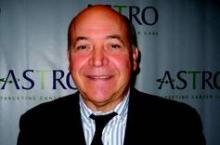SAN FRANCISCO – Men who undergo radiation therapy for high-risk prostate cancer are less likely to have a recurrence and to die if they also receive long-duration androgen deprivation therapy. A long duration roughly half of that typically used appears to strike a good balance between efficacy and quality of life.
These were among the key findings of a pair of phase III randomized trials reported at the annual scientific meeting of the American Society for Radiation Oncology.
“Quantity of life became the most important piece for us as we were trying to control prostate cancer. But today, so many of our localized prostate cancer patients are going to survive their illness that quality of life becomes exceedingly important,” said Dr. Colleen Lawton, vice chair and clinical director of the department of radiation oncology at the Medical College of Wisconsin, Milwaukee, and moderator of a related press briefing.
Efficacy data support long-duration ADT
In the first trial, called DART 01/05 (or AADLPC) and supported in part by the AstraZeneca Fund, investigators led by Dr. Almudena Zapatero, a radiation oncologist at Hospital Universitario de la Princesa, Madrid, studied 355 patients with intermediate- or high-risk prostate cancer.
The patients were randomized evenly to high-dose radiation therapy of at least 76 Gy, plus either short-duration ADT (4 months before and during radiation only) or long-duration ADT (4 months before and during radiation and 24 months afterward).
With a median follow-up of 63 months, relative to short-duration ADT, long-duration ADT was associated with better 5-year rates of biochemical disease–free survival according to the Phoenix definition (89.8% vs. 81.3%), overall survival (94.8% vs. 86.1%), and metastasis-free survival (93.6% vs. 83.4%), reported Dr. Zapatero. However, in stratified analyses, these benefits were seen only in the men with high-risk disease.
The two treatment groups did not differ significantly with respect to rates of acute and late rectal and urinary toxicity.
The study is noteworthy as it supports use of more costly high-dose radiation and hormonal therapy, said Dr. Zapatero. “We have demonstrated that we can get a 10% absolute benefit in PSA [prostate-specific antigen] control and overall survival and cancer-specific survival with acceptably low complications for high-risk disease. This is what we know now. We now know that … intermediate-risk disease probably doesn’t need any complementary [hormone therapy],” she said.
“We await longer follow-up to confirm these results and to determine the impact of long-term hormones according to the risk subgroup,” added Dr. Zapatero, noting that high-risk patients can be further stratified according to T3 stage, high Gleason score, and undifferentiated tumor histology. “Probably, if you have one factor, you are going to need less long of a duration of hormones, probably close to 18 months. And if you have two or three, what we call very high risk disease, you are going to need longer hormone therapy and the highest radiation [dose].”
Explaining the importance of the findings, Dr. Lawton, the press briefing moderator, said, “We have shown over time that increasing the dose [of radiation] to the prostate and immediate surrounding tissues improves outcomes. We have also shown for our high-risk patients that adding hormone therapy improves outcomes. But what we have yet to show is … do you really need the hormone therapy if you use dose escalation? And the answer is yes.”
Shortening duration of ADT improves testosterone recovery
In the second trial, known as PCS IV, investigators led by Dr. Abdenour Nabid, a radiation oncologist at Centre Hospitalier Universitaire de Sherbrooke, Quebec, Canada, studied 561 men with high-risk prostate cancer who had been treated with radiation therapy (44 Gy to the whole pelvis and 70 Gy to the prostate) and randomized to 18 months or 36 months of ADT. AstraZeneca collaborated on the trial.
Previously reported results suggested that 18 months was just as efficacious as 36 months for overall survival and cancer-specific survival (ASCO 2013 Annual Meeting. Abstract LBA4510).
With a median follow-up of 84 months, relative to counterparts who had received ADT for 36 months, patients who had received ADT for 18 months were more likely to have recovery of testosterone values into the normal range (55.7% vs. 44.9%, P = .01) and had a shorter median time to recovery (47.2 vs. 73.2 months, P less than .001).
Relative to counterparts who did not have testosterone recovery, patients who did had significantly better scores on 18 of 30 items on the European Organization for Research and Treatment of Cancer’s global quality of life questionnaire (EORTC30) (P less than .01 for each) and on 10 of 25 items on the related Prostate Module (PR25) (P less than .01 for each).




